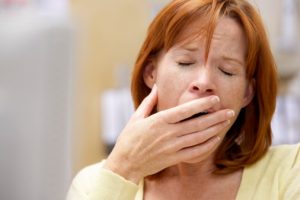
Chronic fatigue syndrome (CFS) associated with early menopause
Chronic fatigue syndrome (CFS) is associated with early menopause, according to research. The association between CFS and menopause may help explain why CFS is more common among women than men. Furthermore, being aware of the association can prompt healthcare workers to closely monitor women with the syndrome.
A study compared 84 women with CFS and 73 healthy control women who completed detailed questionnaires on their gynecologic history.
The women with CFS were 12 times more likely to have pelvic pain unrelated to menstruation when compared to the healthy women. CFS women were also more likely to report excessive bleeding, significant bleeding in-between periods, and missing periods. CFS-affected women were more likely to use hormones for purposes other than contraception compared to the control women.
Furthermore, CFS women were more likely to have undergone at least one gynecologic surgery. They experienced menopause at an earlier age than the healthy women.
The executive director of the North American Menopause Society (NAMS) Margery Gass said, “CFS can take a tremendous toll on women’s lives at midlife and on our society and healthcare system. Being aware of the association of CFS and earlier menopause can help providers assist women in sorting out symptoms of CFS from symptoms of menopause.”
The study didn’t answer every question though. Is early menopause the cause of later health problems or simply the result of earlier health problems not recognized as the cause of early menopause?
Other symptoms commonly experienced during menopause include:
- Hot flashes
- Night sweats
- Trouble sleeping
- Weight gain
- Irregular periods
- Mood changes
- Vaginal dryness
Tips to beat menopause and chronic fatigue syndrome
Fatigue is a common symptom of menopause and the primary problem in CFS. Fatigue can have you feeling low, making you unable to carry on with your daily tasks and impeding on your quality of life. Here are some tips to beat menopause fatigue and chronic fatigue syndrome:
- Exercise regularly even if you feel low on energy, as exercise actually promotes energy.
- Minimize caffeine and alcohol consumption. Although these beverages may give you a bolt of energy at first, they can leave you feeling even more tired once they run their course.
- Limit your food portions, as overeating can promote low energy and fatigue.
- Relax! Stress can aggravate your fatigue.
- Get proper sleep. Poor sleep can make you feel even worse, so put in the extra effort to bring your quality of sleep up.
- Stay hydrated. Better than coffee, water can actually keep you energized while dehydration can lead to fatigue.
- Don’t overbook. Spreading yourself too thin by running around between appointments can cause greater fatigue.
- Try herbal remedies. Black cohosh and valerian are two well-known herbal remedies that may help reduce menopausal symptoms. It is important to speak to your doctor about these first if you are currently on other medication.
- Adjust the temperature. Having hot flashes and sweats can make you feel uncomfortable, so by saying cool with the use of a fan or air conditioner, you can help reduce these symptoms
- Develop a good sleep routine. Going to bed and waking at the same times every day, including the weekends, can help make preserve energy and make you feel energized.
- Fresh air. Getting out of the house or workplace can do wonders for your overall health.
By following these tips and working with your doctor, you can better address the fatigue associated with menopause and CFS.